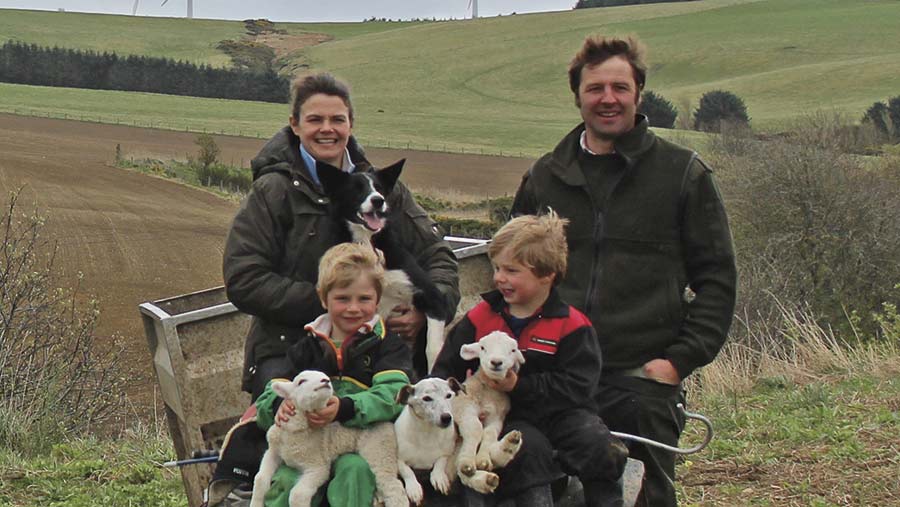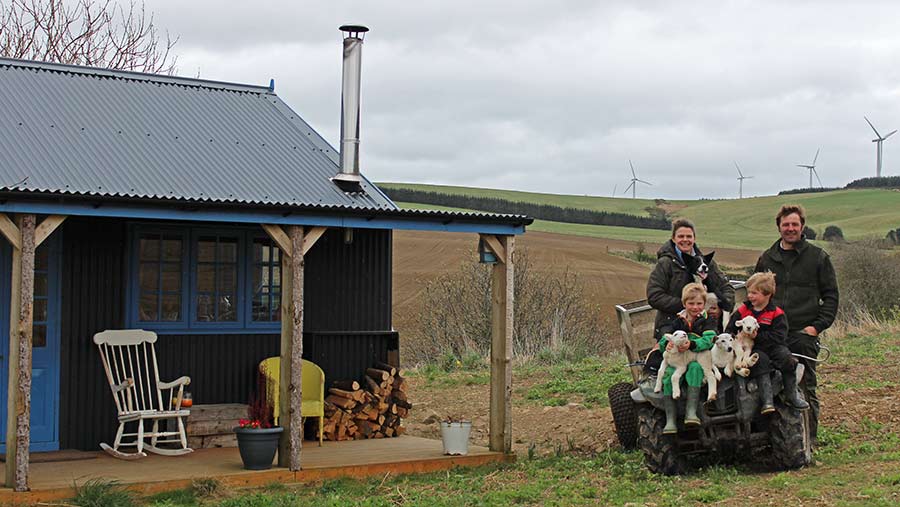Aberdeenshire farming: ‘Fabulous countryside and adventure’
 Jane Foad farms with her husband James and their two sons
Jane Foad farms with her husband James and their two sons The View From Here is a Farmers Weekly series giving an insight into what life is like for rural women around the world.
We’ve been putting questions to people in countries all around the globe in order to get a sense of the joys and challenges of life in the countryside.
The series also highlights the diversity of experiences of farming women in the UK – so for this instalment, we are chatting to Jane Foad in Aberdeenshire.
See also: New Zealand farming – living the dream, despite the weather
What sort of farm do you live on?
My husband, James, and I managed to buy our own 40ha farm five years ago, which we have increased with some additional rented ground to about 80ha.
We have a breeding flock of 400 ewes, we grow malting barley and strawberries and have a wee glamping [camping with an emphasis on more luxurious accommodation than usually associated with staying outdoors] business called Boutique Farm Bothies.
How involved are you with the farm?
I’m extremely hands on. James works off farm, doing farm management and agronomy consultancy in Poland as well as a farm assurance assessor here in Scotland.
This takes up the majority of the usual working week, making weekends his on-farm time.
Our business has grown at the same time as our family – we have two boys, five and six-years-old – so while at home with the children I took on the chores that James couldn’t manage due to his off-farm commitments. We work to each other’s strengths.
James grows the strawberries, I pick and market them. We both enjoy our sheep work and I am particularly involved at lambing time.
The cereals are James’ passion and the glamping bothies are mine.

Jane Foad, along with her husband James, managed to buy their 40ha farm some years ago. They now live there with their two sons
What’s the farming typically like in your area?
Fabulous rolling countryside with large fields of arable and pasture, from mountain to sea. Aberdeenshire really is glorious.
How poor or prosperous are farming families in your area?
Here they are muddy-boot mixed farmers who appear prosperous if the amount of shiny machinery in their yards is anything to go by.
What the best thing about living on a farm?
As the daughter of a dairy farmer, I don’t know anything else.
However, growing up on a green belt just south of Bristol in Somerset where urbanisation was a breath away, I simply adore the rolling expanse of rural Aberdeenshire.
It is really is the most fabulous place to bring up our two little boys with the freedom and adventure it provides. I love working in partnership with James.
Despite the burden of our borrowings, we are masters of our own destiny, which is relatively unusual in most farming businesses.
It is great to be able to include the boys in our work to give them an education in resources, production, sales and marketing – and they are super helpful for their wee age.
What’s the worst thing about living on a farm?
Not having a lovely restaurant within walking distance. Trying to leave the farm for a night away is a logistical challenge.
What’s the single biggest challenge farmers face in your part of the world?
The political uncertainty of Brexit is causing the greatest concern.
We will need to develop new markets for our lamb if France, our biggest customer, stops buying Scotch lamb.
We are struggling to see the silver lining to this particular cloud, but feel the removal of subsidies will ultimately benefit the more efficient farmers with their eyes on costs of production.
Our family mantra is “ideas without restriction” and I think this is might be the epitome of this.
What makes you laugh?
I can always find the fun in life and have always said that laughing is not only good for the soul but good for your stomach muscles too. I love my children’s little language errors – “Blah Blah Black Sheep”, to mention just one.
Getting together as one whole family, with my parents and brothers too, is a real treat and there is much raucous hilarity around the table which I absolutely adore.
What makes you angry?
Poor customer service – there is no excuse for this. I strive so hard with my service to my own customers to ensure each one has the most splendid experience so I feel irritated when others don’t go the extra mile.
Is there equality between the sexes in farming?
It is not a question of equality, but the best use of resources. I am confident in my strengths within our business and feel I have earned the respect to reflect this.
However, I know as a small female I do not have the physical strength to match my husband, often much to my frustration, but this is the only inequality I have found in farming.
Is farming sufficiently supported by government?
I don’t think, in general, the government and certainly the general public realise to what extent their countryside is managed by farmers.
I often feel that farmers are seen as the baddies when it comes to the environment and yet the passion of farmers for their landscape is unquestionable.
If the government wants to continue providing subsidies, it needs to strike a balance between food production and countryside management – and I am not convinced they have it right just yet.
Tell us something about yourself not many people know
I have a freckle on the sole of my foot. My husband also has a freckle on the sole of his foot – sweet.
